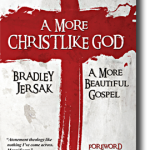Bottom line, I think the New Testament is being handled a lot better than the Old. Here are two thoughts on the last episode.
1. A young adult I know was watching the last episode with a few of her friends. One friend, a young man, who wasn’t churched or familiar with the Bible, said, “I didn’t know Jesus was so loving.”
Whether or not a loving Jesus jumped out at me, that comment reminded me that my own sophisticated misgivings (an occupational hazard of a biblical scholars) may not be the standard by which to judge this mini-series, problems and all. It wasn’t written for the biblically knowledgable but for those whose biblical literacy minimal–perhaps at best a distant echo of children’s Sunday School (which may be why they spent so much time on familiar but minor stories like Samson and Daniel in the lion’s den).
2. One thing the last episode did very well was to get across something of theo-political tensions of 1st century Palestine. In Jesus’ day you had,
(1) the Roman empire keeping a watchful eye on a percolating Jewish nationalism, and crushing it when need be,
(2) various Jewish groups with different ideas of how to get along (or not) with their Roman landlords, and
(3) keen interest among the Jewish religious leaders in following the law of the Old Testament.
On this last point, I was very glad to see that Judaism was not presented as a superficial “keep the law to get to heaven” cult as it is too often portrayed, at least among Protestants. Rather, Jewish attention to maintaining religious purity, and therefore separation from gentile influence, was an expression of faithfulness to the God of Israel in the midst of living under Roman rule.
Being zealous to keep the law was seen as a means of ushering in a new age–where the God of old returns to “save” his people. That “salvation” would come by means of God’s chosen warrior-king, whose title was “messiah” (anointed one). He was expected to lead the people of God in religious purity and political independence, the restoration of Israel’s (and God’s) glory and the meting out God’s judgment upon her enemies.
Jesus, however, preached a kingdom that supplied an alternate ending to Israel’s story. Not a miltary take-over of Jerusalem, but an inclusive kingdom of inner transformation–a kingdom that countered both the empire mindset of Rome–with its abuse of power and religious claims (Caesar was considered divine)–and the Jewish alternative, the messianic age, a Jewish empire of its own.
That is what all this “the meek shall inherit the earth” business is about. It is also why the various sides of this theo-political time-bomb-waiting-to-go-off were upset with Jesus.
with Jesus.
In a lecture about 10 years ago, I heard New Testament scholar John Dominic Crossan put it something like this (he may have written this somewhere, but I haven’t come across it–this is a good faith paraphrase):
If you knew nothing of Christianity and never heard of Jesus, but you understood the political and theological turmoil of 1st century Palestine–the clash of the various Jewish parties, Roman rule, and Greco-Roman thinking–and then someone handed you the Gospel of Mark and you began to read it for the first time, it wouldn’t be long before you started flipping ahead in the story to see when this Jesus was going to be killed.
Jesus’ death–the death of the messiah at the hands of the Romans–was proof positive that Jesus was not the messiah. The messiah is supposed to win, not be executed. This is where Paul will come in–explaining how a crucified and risen messiah is actually the true display of God’s justice and mercy to Jew and gentile alike. I wonder how “The Bible” will address that. I guess we’ll see this Sunday.
At any rate, a proper portrayal of the theo-political tensions of the time will allow a contemporary audience to sense the surprise, and even offense, of Jesus’ words and actions. In my opinion, given all the limitations, I think “The Bible” is doing a good job of this.













